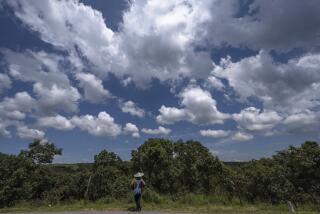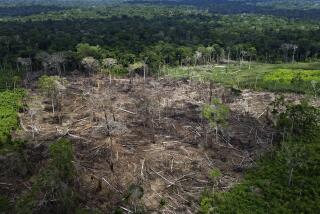Push for Logging in Russia Sparks Debate
KRASNY YAR, Russia — Yevdokia Kaluziga’s wrinkled face tightens with a wistful smile as she recalls the thriving market half a century ago for her hand-sewn leather moccasins and gaiters made of elk fur.
Today, laments the 79-year-old widow, the indigenous Udege people who once fished, trapped and hunted the pristine watershed of the Bikin River have little money and less use for the togs of their bygone traditions. Most Udeges are jobless and despairing of the prospects of fighting off an inevitable influx of logging ventures.
“As far as I can see, we have the same ways and habits as the Russians now,” Kaluziga concedes. “But what can I do about it? People have to live somehow. We need some industry so the young people have work. We can’t just lock ourselves off from the rest of the world.”
That even the last of the disappearing Udeges are giving up hope of preserving their native culture, logging critics say, undermines their efforts to protect the “small peoples” of eastern Russia from foreign timber ventures that would forever change their venue.
Russia is home to more than 25% of the world’s remaining woodlands, and the newly opened, largely undeveloped Far East region has become a magnet for Pacific Rim timber interests, especially U.S. firms searching for fresh wood supplies as tree cutting sparks controversy back home.
But the U.S. government finds itself in an unwitting quandary. Its myriad agencies simultaneously finance both logging proposals and the determined efforts of ecologists to save the Far East for its native peoples. The conflicting programs mean that U.S. taxpayers are footing the bill for both sides of the timber-versus-biodiversity struggle.
Overseas Private Investment Corp., a U.S.-government funded risk-insurance program, is supporting Global Forest Management Group’s bid to log 1 million acres of virgin forest in neighboring Khabarovsk region, including along the pristine Khor River valley. Global Forest is a consortium of 11 Pacific Northwest timber companies seeking raw logs to keep their mills working.
Yet under the environmental protection programs of the commission headed by Vice President Al Gore and Russian Prime Minister Viktor S. Chernomyrdin, the U.S. Agency for International Development has provided $16 million to community development contractors opposed to the projects. Activists paid by U.S. AID grants work in villages throughout the unspoiled forest regions helping to restore traditional economic activities such as hunting, fishing, woodland food gathering and native crafts--job-creating ventures not dependent on logging.
In Krasny Yar, home to half of the 1,400 Udeges left in the Far East, U.S. grant-financed activists from the World Wildlife Fund and the Sausalito, Calif.-based Pacific Environment and Resource Center have been trying to establish a natural foods business to market locally gathered berries, nuts, mushrooms and pine cones.
Income from export sales of such consumables would hardly make the Udeges wealthy, concedes Michael Jones, a PERC community development specialist. But it could boost the abysmal standard of living. Most adult men in Krasny Yar are jobless, as the village’s sole sawmill is idle.
But government officials in Moscow argue that logging for domestic development and export--and jobs--is justified in this region and have been eagerly analyzing foreign joint-venture proposals for exploiting the abundant resource.
Although it has more virgin forest than any other country, Russia lacks money for modern harvesting equipment and for fuel and transport to bring the cut wood to ports and markets.
“Because of the tough economic situation in the country, we have only been logging about one quarter of the area designated as suitable for harvesting each year,” says Anatoly I. Pisarenko, deputy chief of the Federal Forestry Service.
The quantity of timber cut in Russia has fallen from a 1988 level of 11 billion cubic feet to less than 4 billion cubic feet last year, Pisarenko said.
Logging operations financed by South Korea, Japan and Norway are already at work in the Far East and the federal government is now considering new American and other proposals to decide if the economic benefits outweigh the environmental effects.
While the authorities pursue development, those committed to preserving the disappearing culture of the indigenous peoples have reacted with alarm.
Alexei Y. Grigoriev, of the Taiga Rescue Network, says the foreign logging projects are foregone conclusions and the federal government is just going through the motions of environmental reviews they are not obliged to publish or heed.
But organizations such as Taiga Rescue are having difficulty mobilizing resistance to the projects, Grigoriev says, because there are too few people living in the sparsely populated Far East and those who are there often prefer the prospect of jobs to conservation.
Although there is strong demand for wood and wood products outside Russia, transportation costs and a lack of investment in the industries have bridled trade.
“If you are going to try to make wood products here, you would have to have a regional market, and there really isn’t one here,” said Vladimir M. Nosonov, head of the regional forest management service in the ravaged delta village of Verkhny Pereval, west of here.
He said too few people in poor communities in the Primorsky and Khabarovsk regions could afford such consumer luxuries as locally made furniture and cabinets, as unemployment is rampant and those on government payrolls often get their meager salaries late.
Much of the timber harvested in Russia’s Far East now is sold as raw logs for export and most of the timber is taken from logging sites within 100 miles of Pacific Coast ports.
One of those coastal harvesting regions has already been extended into the Bikin headwaters. South Korea’s Hyundai Corp. has been logging westward from the port of Svetlaya. It has been granted rights to some of the eastern extreme of the watershed, where trees are classified in the least-protected Third Group by the federal Forestry Ministry--those having “mainly exploitative value.”
Although public sentiment toward logging is largely indifferent here and in neighboring villages that were built in the 1950s to house workers for the now obsolete sawmills, some Udeges carry on the fight to silence the chain saws.
“To return to the old way of life is already impossible,” says Pavel V. Sulyandziga, the Primorsky regional government’s ombudsman for indigenous affairs and an Udege from Krasny Yar.
“The fish stocks have already dwindled because of gold panning that was allowed in the 1980s and the logging projects in nearby territories have already affected the ecology. But neither can we give up and let our traditional ways disappear. We have to find means of development that can coexist with the indigenous lifestyle.”
More to Read
Sign up for Essential California
The most important California stories and recommendations in your inbox every morning.
You may occasionally receive promotional content from the Los Angeles Times.











